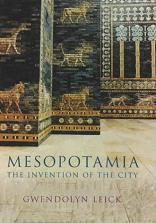
Mesopotamia: the Invention of the City
Gwendolyn Leick
252 pages including index
published in 1993
Continuing with my interest in Bronze Age history, I got Mesopotamia: the Invention of the City from the library, about the only book on Mesopotamia actually present there at the time and not hopelessly (decades) out of date. I know little about Mesopotamia other than the stuff everybody knows, it being probably the oldest civilisation in the world, inventors of written language and the city, yaddayaddaya. All I knew about it I learned from my old childrens encyclopedias, long obsolete even when I read them some twenty years ago...
Gwendolyn Leick didn't set out to write a general history, but more of an overview of the ten most important cities that made up the area: Eridu, Uruk, Shuruppak, Akkad, Ur, Sippar, Nippur, Ashur, Nineveh and Babylon. She does this in chronological order, with Eridu the oldest established and Babylon the youngest. Considering that Babylon was an old, old city when Rome yet had to be founded, you can imagine how old the earliest cities were, as far away in time from the founding of Rome as we are from its fall. Which is the most important point that I picked up from this book, how long Mesopotamia's history was, that later cities might have had the same sort of relationship with the very first ones as we have with Rome and Greece.
Each of the cities gets its own chapter, after a short introduction in which Leick sets out her objectives. She starts each chapter with the story of its rediscovery and subsequent archaeological history, which often show how little of a given city has actually been dug up. She summarises the available archaeological evidence and the interpretations of it, as well as the history of each city, as far as we know it. So far, so conventional, but what Leick also does is to examine the religion and mythology of each city and examines what this says about it. Religion was important in Mesopotamia, with each city having its gods, who were supposed to live in their temples and could doom a city if they left it. Several examples are given of how conquered cities lost their gods, these being taken away to the temples of their conquerors, as well as how new rulers showed their respect by restoring gods to their old cities.
What this also showed was the existence of a certain historical perspective in Mesopotamia. Some of the older cities, like Eridu and Uruk, became sort of spiritual centres, sponsored and maintained by later rulers to prove their legitimacy. Religion of course played a role in this, with the gods of the older cities being appeased and controlled this way. You could compare it to the way modern states consciously use their own history to legitamise themselves, something I hadn't expected to find in such ancient states.
Mesopotamia: the Invention of the City at times was a bit of a slog, with the repeating mini chapters for each city; not everything was equally interesting. There's also the question of how up to date it is, considering it was published seventeen years ago. On the whole however this was a good book to have read, giving me some idea of the vastness of Mesopotamian history.